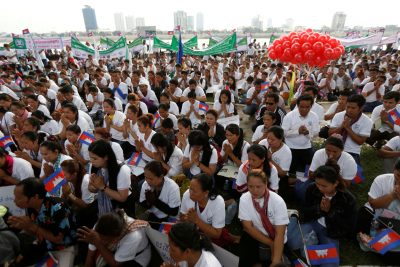eastasiaforum.org, 18 May 2019
Author: Sok Kha, Phnom Penh
Cambodian Prime Minister Hun Sen’s delegation has returned from the second Belt and Road Forum in Beijing, bringing back 10 newly signed agreements. The trip was closely followed by Cambodians, who have an increasing interest in the course of the relationship between Cambodia and China.

uncaptioned image from article
Economically, China has undeniably become Cambodia’s largest economic influencer. China is Cambodia’s largest foreign investor, bilateral donor, trading partner, rice buyer and source of foreign tourists. Cambodia has embraced (BRI) since its inception in 2013. From infrastructure and connectivity development to cross-border trade and tourism, Cambodia has benefitted significantly from cooperation with China under the BRI framework.
As a matter of illustration, over 20,000 Cambodian workers — mostly low-skilled and female — are employed by over 100 factories operating within the BRI-associated Sihanoukville Special Economic Zone to produce textiles, machinery and other light manufacturing products for export. With the zone’s second phase of development underway, at full capacity it will host up to 300 factories employing over 100,000 Cambodian workers.
The benefits are substantial considering the extent of indirect employment and income generation (for example, through businesses supported by the spending of workers and the prevention of risky migration). The ongoing construction of the Phnom Penh–Sihanoukville Expressway and planned airport projects in Phnom Penh and Siem Reap have great potential to enhance connectivity within Cambodia and beyond by improving logistic efficiency, reducing trade costs and deepening regional integration.
That said, local concerns and discontent at Chinese investment are also growing. Cambodia’s increasing dependency on China will inevitably pose certain constraints on the former’s foreign policy options, with ASEAN’s failure to issue a statement on the South China Sea in 2012 a telling example. This dependency has increased over 2018 as the Hun Sen government’s relationships with the United States and Europe have come under increasing strain due to undemocratic developments in the country. Some view China as an opportunist, exploiting this situation to cultivate stronger relationships with Cambodia’s government elites.
Many perceive elite Cambodian political backing to have facilitated the approval of China-funded and China-initiated projects, potentially enabling non-transparent and inconsistent information flows as well as limiting engagement from relevant stakeholders. NGOs and civil society have frequently raised concerns on issues ranging from environmental damage to land disputes. Public discontent has over the last few years as people have increasingly perceived the cooperation as non-inclusive and, worst of all, adversely affecting local livelihoods and the environment.
A case in point is the ‘Chinese issue’ in Sihanoukville. Development has picked up at lightning speed thanks to the influx of Chinese money. But basic public services are often failing to keep up with the increasing economic activity. Problems over trash collection and the already-limited water and electricity supply are worsening. Some locals even point their fingers at the increasing numbers of Chinese to explain weaker phone signals.
While some Cambodians have been left better off by Chinese investment, minimal trickle-down benefits and adverse effects have left many locals frustrated. They view projects as staffing too many Chinese, offering limited job opportunities to local people. They also complain about Chinese businesses crowding out local businesses, with Chinese money inflating prices.
Cambodia’s increasing dependency on China needs to be taken into consideration and the benefits of BRI-linked projects need to be shared among the Cambodian population. The primary responsibility to ensure that the use of China-backed resources aligns with Cambodia’s development needs. China, for its part, can assist by setting transparency and project standards as prerequisites for awards and tenders.
Most importantly, both countries need a stronger level of bilateral cooperation to which ensures all levels of society are working together to ensure viability and sustainability. The Cambodian government needs to deepen its engagement with civil society groups in a consistent, transparent and fair manner. China needs to sincerely deploy, strengthen and promote people-centred public diplomacy [JB emphasis] tools in Cambodia to win the hearts of locals and secure broader support that goes beyond Cambodia’s chief executives.
Only then can China ensure a more durable foothold in the country and the successful implementation of the BRI.
Sok Kha is a development consultant based in Phnom Penh, Cambodia. He is currently engaged as a Regional Cooperation Specialist for the Asian Development Bank.
No comments:
Post a Comment